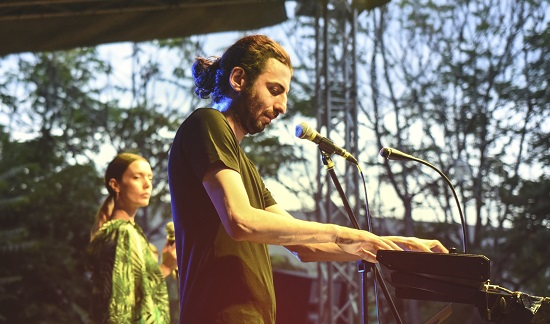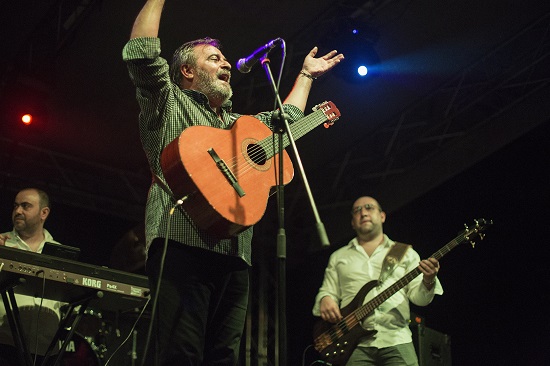All pictures courtesy of Andrei Muşat
It’s tough being Bucharest. All the city has ever wanted was to have a good time. Just look at what The Chambers Gazetteer had to say about the place as long ago as 1908: "The number of cafes and gaming tables is excessive; and altogether Bucharest has the unenviable reputation of being Europe’s most dissolute capital, with all the vices but few of the refinements of Paris." Now doesn’t that sound like fun?
But it’s never that easy. Even back then, Chambers had to warn adventurous thrillseekers that "Bucharest has been several times besieged; and between 1793 and 1812 suffered twice from earthquakes, twice from inundations, once from fire and twice from pestilence". Mind your step. Still, the locals got on with the important business of having a good time, and somehow Bucharest managed to carry on partying well into 1940, long after the lights had gone out across the rest of Europe.
But things got tougher. For the 45 years until 1989 Romania laboured under eastern Europe’s most repressive and fun-sceptic communist regime. During those years, any cultural activities had to be officially approved. And improving. And big. Vast choreographed paeans to Ceausescu staged in sports stadia or huge concrete conference halls. There’s a time and a place for spontaneity, and communist Bucharest wasn’t it. The infrastructure of small-to-medium sized spaces needed for a domestic youth culture to grow and encounter new ideas just didn’t exit.
After the old regime collapsed much heavily-subsidised industry, stripped of its state support, followed suit. That freed up precisely the kind of space that youth culture can take root in. And Bucharest blossomed with venues and clubs opening up in the bits of town that had escaped the bulldozers in Ceaușescu’s bid to turn the Paris of the East into the Pyongyang of the West. Abandoned factories and semi-derelict palaces once confiscated by the communists but now stuck in a limbo of uncertain ownership welcomed bands and DJs from across the country and the continent. Representatives of an underpaid bureaucracy could be very obliging when it came to matters like safety certificates, so free of red tape and health and safety fusspots Bucharest was a boom town. Delicious dissolution was back in the air. Bucharest was partying hard and balls to the refinements of Paris.
On October 30 2015, an abandoned shoe factory, repurposed as a nightclub and arts venue called Colectiv, hosted an album launch party for local rock band Goodbye to Gravity. The fire that swept through the highly flammable interior killed 64 people and was a direct consequence of the absence of proper licencing for venues. Bucharest’s nightclub and live music scene was almost obliterated. Suddenly capacity limits and fire escapes were considered more than just optional extras. And remember what that gazetteer said about earthquakes? Bucharest sits near a major geological fault and suffered three devastating category 7+ earthquakes between 1940 and 1986. And yet numerous clubs, bars, cinemas and theatres were set up in so-called "red disc buildings", places so precariously built than any such kind of public use is forbidden. The red discs fixed to the front of buildings, warning that they were a category one seismic risk, went from being adornments to being the headstones of Bucharest’s live venues.
Scores of places closed voluntarily, their owners offering up prayers of thanks that it hadn’t been them at the sharp end. Others were closed forcibly as the authorities started to actually do some checking around the safety certificates they had waved through so lucratively. By the end of 2015, as anti-corruption protests brought down local and national governments, only a tiny fraction of central Bucharest’s clubs and venues remained open.
And where does that leave Bucharest now? The handful of indoor venues that are licenced are so busy that promoters are fighting for slots. And that difficulty makes promoters risk averse, while also making venue owners’ eyes ring up the $$$ signs like Sylvester the Cat after Tweety Pie’s just clobbered him. Diversity has been trampled and the hold that tech-house has over Bucharest’s diminished club scene threatens to become outright hegemony. Unless you fancy going to see Iron Maiden, Scorpions or Muse at this summer’s mega-gigs in the plaza outside Ceausescu’s monstrous "House of the People", that is.
So these are tough times for the team at The Attic Bucharest’s tQ-friendly music and culture website, to stage the city’s first Outernational Days festival. They’re no strangers to the more canonical "World Music" type stuff in these parts. Bucharest is as familiar as any European capital with the internationally approved roster of so-called world music. And Romania has its own heavyweight entries in the traditionalist canon, with globally famous lăutari acts like Taraf de Haidouks and Fanfare Ciocărlia. The more esoteric Outernational ethos is a harder sell, though. For one thing, Bucharest can sometimes be bracingly old-fashioned where matters of race are concerned.
During some downtime from the festival I wandered into one of the city’s most famous churches and ended up deep in conversation with the priest. All I wanted to do was talk about the Byzantine murals. All he wanted was to warn me that proof of the imminent arrival on earth of the antichrist could be found in the fact that 90% of the England team competing in the European football championships in France were black.
Flat-out racism like that is rarer but not unknown among Bucharest’s urban young, and Dragoș Rusu has worked hard to combat such attitudes. Rusu, the editor in chief at The Attic, has already staged half a dozen gigs featuring Outernational acts such as Indonesian outliers Senyawa, Praed of Lebanon and Paradise Bangkok International Molam Band. This has been through his DJ residency at Control Club, the only significant alternative venue in Bucharest to emerge still operating from the post-Colectiv chaos. The Outernational Days festival is an extension and expansion of this work, as he tries to build the momentum he says he has seen building around this very new scene.
But of course this is Bucharest, so things are tough.

Friday night headliners Konono no.1 from Democratic Republic Of Congo phone through on the Thursday to announce that they have been refused visas to enter Romania. And on Saturday morning new security measures at Brussels airport mean that Burkinabé act Baba Comandant & The Mandingo Band miss their flight, leaving a huge gap in that night’s line-up. Idris Ackamoor & The Pyramids have made it from the USA, and Maurice Louca from Egypt compensates for the loss of Konono no.1 with a thrilling performance on the Friday night. But inevitably the absences cost the festival much of its cross-border scope.
What remained for the festival to do was focus on its other main aim: placing local manele music into an Outernational context.
Manele, which roughly translates as "the songs", is pure Outernational. Wander away from Bucharest’s wealthier districts and it’s the music blasting from every block of flats and from every taxi. It forms the background din in every market. It’s somewhere between being Romania’s punk and its hip hop, but with a cultural reach far closer to the latter than the former. And the guardians of Romanian culture hate it, not least because it is so closely associated with the Rroma community. It is there, rather than at members of the English football team, that most racism in Romania is directed.
Manele is the offspring of lăutari, born in part out of communist Romania’s friendly relations with assorted Middle Eastern countries in the 80s. Fraternal exchanges of factory staff were undertaken and people returned with tapes of the music from their temporary homes in Egypt, Libya and Iraq. It was through exposure to these that Dan Armeanca, the undoubted headliner of Outernational Days, is generally held to have invented manele. Armeanca, a bandleader performing traditional lăutari at weddings and parties, received tapes from relatives working as builders in the middle east and incorporated those sounds in his music. Then, after 1989, eager Romanian musicians went on shopping expeditions to Istanbul and returned with casio keyboards, all programmed with oriental or middle eastern preset rhythms.
Incorporating those synths and those sounds changed the whole dynamics of lăutari, reducing the size of bands from the sometimes huge Rroma tarafs down to as little as two or three people, as well as simultaneously easternising the music and reducing the complexity of the arrangements. This in turn led to more and more bands being formed which were easier and cheaper to book, resulting in a phenomenon akin to the whole wedding music boom around the eastern Mediterranean.
The assertive orientalism of the new music they created, coupled with the fact that it was often sung in the Rroma tongue, rather than in Romanian, appalled cultural commentators, who after the 1989 revolution were mostly either nativist or westward-looking. As with punk or gangster rap, the first manele boom in the early-to-mid 90s saw vigorous campaigns to get the music removed from radio and TV, or even to have it banned altogether. But that couldn’t stop the performances continuing at weddings and parties. This wasn’t music that existed to be broadcast, or commodified, it was just the soundtrack of the good times in people’s lives and so became inescapable. Indeed in its infancy manele was as likely to be called "muzica de petrecere", or "party music".

Inviting Dan Armeanca, newly returned to Romania after several years living in Canada, to headline the Saturday night of this event is a huge step both in terms of recognising manele’s place in the global currents of music and culture, but also of re-integrating this despised form into the Romanian cultural scene. Where the former is concerned, Armeanca’s performance, as well as that of other manele-influenced Romanian acts such as Khidja, Miti Novomatic & Marius Vișinescu, and Raze de Soare is a triumph. Likewise back at Control Club in the small hours, where manele evangelist Paul Breazu’s Paradaiz Tape Mașina project is mixing up rare old recordings of manele’s cradle cries, and taking the roof off the place. Hearing that stuff has a powerful effect of reminding one just how far east one has come. Something that much of Bucharest works hard to try and make you forget.
And (re-)integrating manele into the arts scene, if not the actual mainstream? This being Bucharest, it was tough. Ticket sales were reasonable but not stellar, suggesting just how difficult a sell both Outernational in general and manele in particular remain to the city’s festival-going types. And these were pretty much the only people in attendance. The bulk of the festival took place in the courtyard of a derelict factory close to Bucharest’s main Rroma districts of Rahova and Ferentari. On leaving the venue at the end of each day to go to one of the after-parties either at Control Club or at a terrace in a nearby park one passed through a vast flower market staffed almost entirely by local Rroma traders, many listening to manele while they work. But within the venues it was hard to identify much if any Rroma presence among the crowd of hip, middle class new media professionals. Maybe they just don’t want to join in.
But Dragoș makes it plain that he’s not giving up. Several more Outernational gigs are imminent, starting with Cairo’s Dwarfs Of East Agouza in a few weeks. And those gigs are being lined up for new venues that are slowly starting to establish themselves in time for the great rush indoors that will accompany the start of Bucharest’s cruel winter. And he’s already planning Outernational Days 2 for next year, with – he promises – a more Sahelian and west African feel. Visas and airport security permitting. A little more luck with headline acts actually arriving and a bit more success engaging with a more diverse audience could see a good festival turning into a great one.


